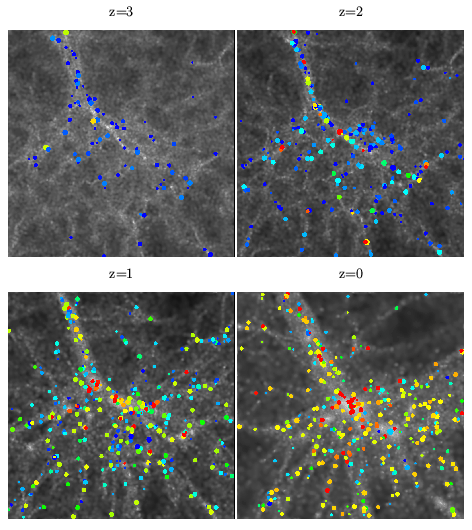The GIF project: Tracing the evolution of galaxy formation
The GIF project is a joint effort of astrophysicists from the MPA and
from Israel. Its goal is to investigate the properties of galaxies
in the context of hierarchical structure formation.
Some of the people involved in the project are:
- Garching:
- Antonaldo Diaferio
- Guinevere Kauffmann
- Hugues Mathis
- Volker Springel
- Simon White
- Jerusalem:
- Avishai Dekel
- Yair Sigad
- Rachel Somerville
The GIF project has carried out a set of high-resolution N-body
simulations of four popular CDM universes in cosmologically
representative volumes (the code was kindly provided by the
VIRGO Supercomputing Consortium.
VIRGO has also used the simulations
for some of their studies). Afterwards, galaxies were added using
semi-analytical recipes on halo merger trees derived directly
from the simulations themselves. This has been the first (and to-date still
is) the only work which combines the most powerful state-of-the-art
computer simulations with semi-analytical models in this way.
Shown below is one of the clusters from the tauCDM simulation at z=0. The
size of the region shown is 21x21x8 Mpc/h.

Shown is the density of the Dark Matter distribution using a log colour scale.
Click here
for a high quality mpeg movie which shows the evolution of this
cluster from a redshift of 20 to present time (Dark Matter only).
The same comoving region looks like this if galaxies are added:

The dark matter is shown in grey scale.
Galaxies are shown as circles colour-coded according to their star formation rate:
the sequence red, yellow, green and blue represents an increasing rate of star formation. At early
times (top left panel) there exist only a few galaxies forming stars at a very high rate. As time
goes on, from z=3 to z=0, more galaxies form and, at the same time, some galaxies run out of
gas, form fewer stars and become green, yellow and red. At the present time (z=0), red galaxies
populate the central region of the cluster, whereas blue galaxies can be found in the outskirts of
the system. This is very similar to what is observed in the real Universe.
A slice of thickness 8 Mpc/h through the whole simulation box (which is
85 Mpc/h on a side) would look
like this. The colours now denote the B-V colours of the galaxies,
ranging from red for ellipticals to blue for irregulars.

The consortium is now using these techniques to
add the galaxy population to high resolution simulations constrained to reproduce
the observed large-scale structure of the local Universe. See
HERE for an image of
the dark matter distribution in one of these constrained realisations.
Here is a list of publications from GIF:
-
The Large-scale Distribution of Galaxies, G. Kauffmann, A. Diaferio,
Annual Report of the MPA, 1998, pp.25-29
-
Clustering of Galaxies in a Hierarchical Universe: I. Methods and Results at z=0, G. Kauffmann, J.M. Colberg, A. Diaferio, S.D.M. White, 1999, MNRAS, 303, 188-206,
Preprint astro-ph/9805283
-
Clustering of Galaxies in a Hierarchical Universe: II. Evolution to High Redshift, G. Kauffmann, J.M. Colberg, A. Diaferio, S.D.M. White, 1999, MNRAS, 307, 529-536,
Preprint astro-ph/9809168
-
Clustering of Galaxies in a Hierarchical Universe: III. Mock Redshift Surveys, A. Diaferio, G. Kauffmann, J.M. Colberg, S.D.M. White, 1999, MNRAS, 307, 537-552,
Preprint astro-ph/9812009
-
Clustering of Galaxies in a Hierarchical Universe: IV. Cluster galaxies at high redshift, A. Diaferio, G. Kauffmann, J.M. Colberg, S.D.M. White, in preparation
-
Topology and Geometry of the CfA2 Redshift survey, J. Schmalzing, A. Diaferio, 1999, MNRAS, in press,
Preprint astro-ph/9910228
-
Ab Initio Formation of Galaxies, Groups and Large-Scale Structure, A. Diaferio, Invited talk at the IAU Colloquium 174 "Small Galaxy Groups", Turku, Finland, 13-18 June 1999, M. Valtonen and C. Flynn editors,
Preprint astro-ph/9908263
-
Mass estimation in the outer regions of galaxy clusters, A. Diaferio, 1999, MNRAS, 309, 610-622,
Preprint astro-ph/9906331
If you have any comments, if you are interested in GIF, or if you want
to use some of the pictures shown here please send a mail to
Antonaldo Diaferio
or to Guinevere Kauffmann.
Last modified: Fri Jan 14 11:46:05 MET 2000
by Virgo Administrator



